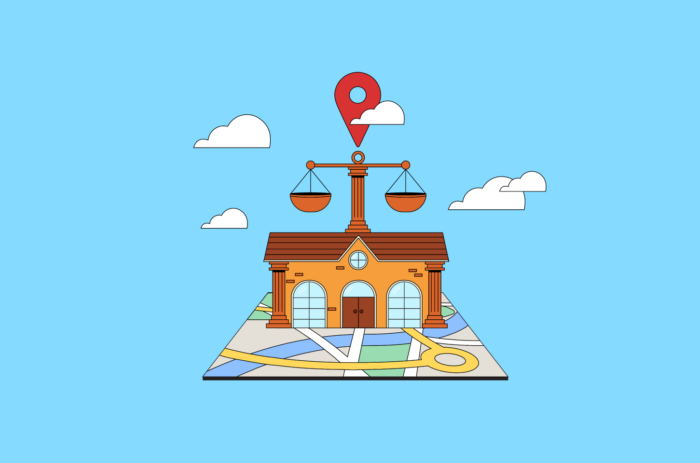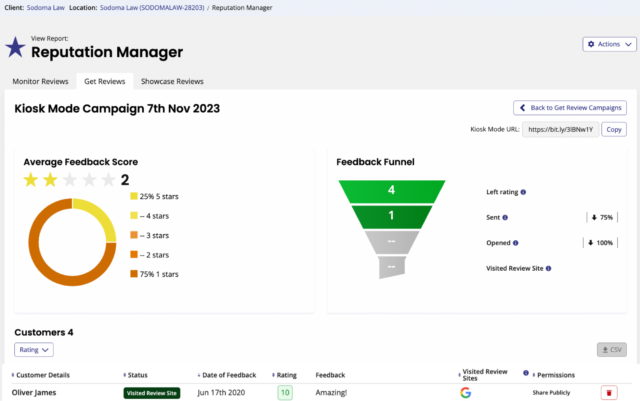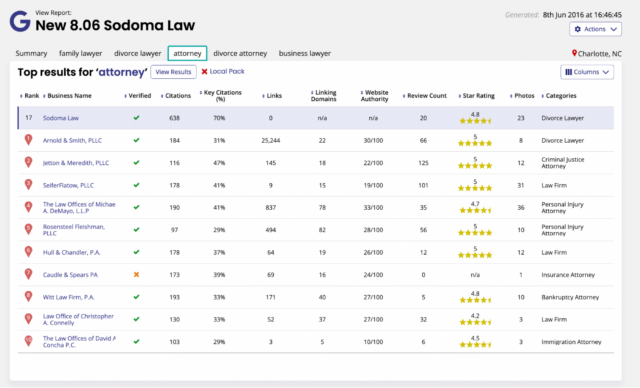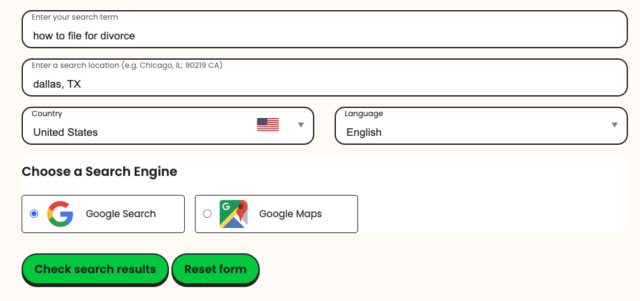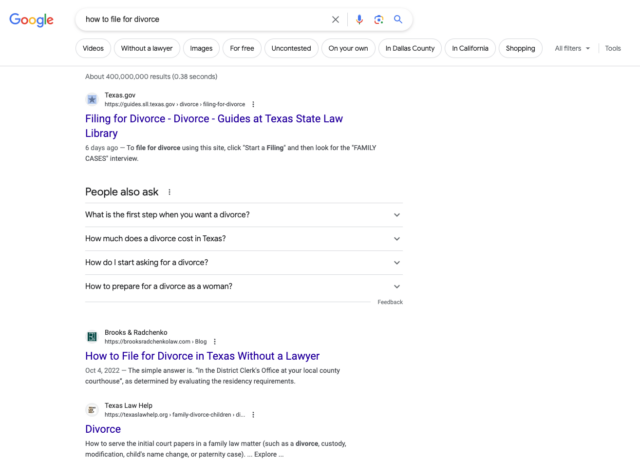Whether they’re looking for answers, or looking for a lawyer, legal services consumers turn to Google. Many of these searches have local intent. Therefore, local search engine optimization (SEO) strategies are remarkably effective for lawyers to “get found” by potential clients.
Defining local
For our purposes, I’m going to define local SEO to include all of the things that a law firm can do to improve visibility in search results for relevant local queries and convert that visibility into a client.
By local queries, we mean terms like ‘michigan dui lawyers’ or ‘lawyers near dallas’. Location modifiers make it obvious to Google that searchers want something local to them, or a specific area.
Too many articles about local SEO focus solely on ranking.
You can rank for irrelevant queries and it won’t help you grow your firm. You can rank for relevant queries, but if you don’t have a competitive number of reviews, potential clients won’t call. It’s not that ranking isn’t important, but it’s a means to an end. In the context of law firms, one of those ends is earning new clients.
Your Local SEO Checklist for Lawyers
- Local SEO Research and Analysis
- Website Optimization
- Google Business Profile (GBP) Optimization
- Reviews
- Citations and Directories
- Link-building
- Content Marketing
- Performance Measurement and Management

Ready to improve your rankings? Talk to us about our Local SEO Services
Why Local SEO is Important for Law Firms
At AttorneySync, we surveyed 5,000 Google Consumer Survey respondents. We asked:
“If you thought you needed a lawyer, how would you find one?”
The top two responses?
- Google (17.2%)
- Internet (11.7%)
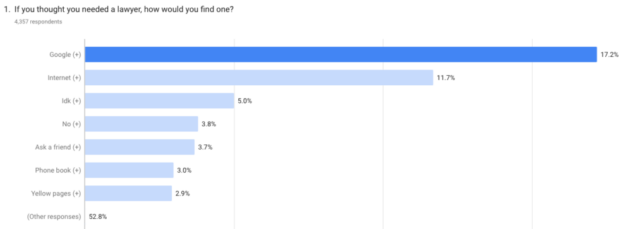
Most recent legal profession research that I’ve come across reports similar results.
Clio’s Legal Trends Report 2019 found that 57% of respondents searched for a lawyer on their own, as opposed to a referral, with leading sources:
- Search Engine (17%)
Martindale-Avvo’s Hiring An Attorney 2019 survey respondents were asked:
“What resources did you use to find an attorney?”
If you hadn’t guessed by now, search came out right near the top:
- Google (43%)
Further, online review sites, like Yelp, Avvo.com, Lawyers.com, Google and online directories came in at 46.53%. And how do many people access sites like these? Yes, a Google search.
Search engines (organic search), particularly Google, are a leading destination on a legal services consumer’s journey to hiring a lawyer. Local SEO is how you attract and convert clients from organic search.
Understanding the Local Legal Services Searcher
Perhaps the most important aspect of successful local law firm SEO is understanding the local legal services searcher. Too many lawyers and legal SEO consultants fail to prioritize audience research.
While most focus on bottom-of-the-funnel lawyer searches (i.e. chicago personal injury lawyers), few focus on potential clients that are at an earlier stage in their hiring journey. The overwhelming majority of local legal searches relate to research on a life-legal issue.
For example, many people are searching for answers to questions about getting arrested, well before they search for a criminal defense lawyer near them.
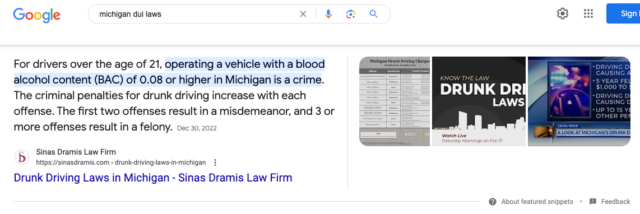
Another common local legal services searcher oversight relates to geographic modifiers. Many legal queries lack geo modification altogether (i.e. lawyers near me). In the U.S., others are modified by state, county, and city. In fact, in major metropolitan areas, these searches may also be modified by neighborhoods and other local community districts.
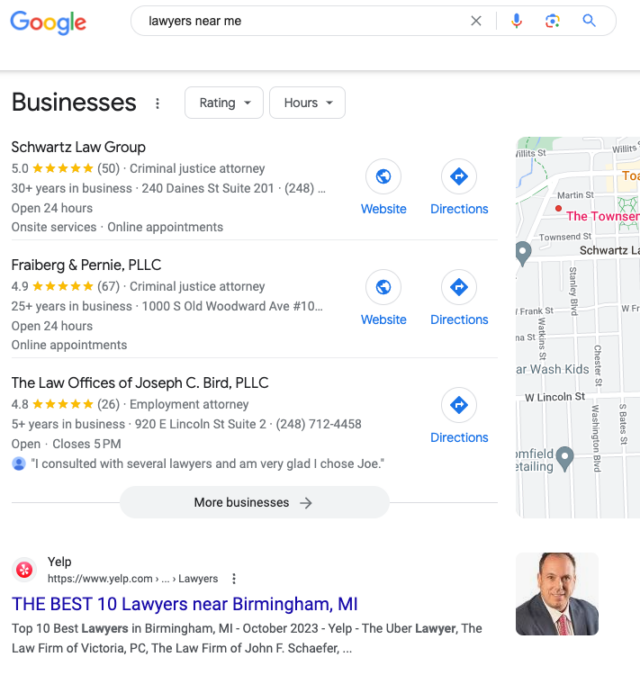
While you should conduct research for your own firm, here are a couple of additional observations from my experience:
- Proximity matters a lot to local legal services consumers.
- In many contexts, people tend to perform legal searches outside working hours.
- Many legal services consumers will contact firms without clicking through to websites.
- Legal services consumers prioritize reviews over rankings. Ranking is necessary, but not sufficient on its own.
Understanding the interplay between how legal services consumers search and how Google localizes results is essential to maximizing local SEO results.
Local Law Firm SEO Basics
First, it’s worth distinguishing between Local Services Ads, the Local Pack, and localized organic results.
Here is a Google SERP for the query “lawyers near chicago”:
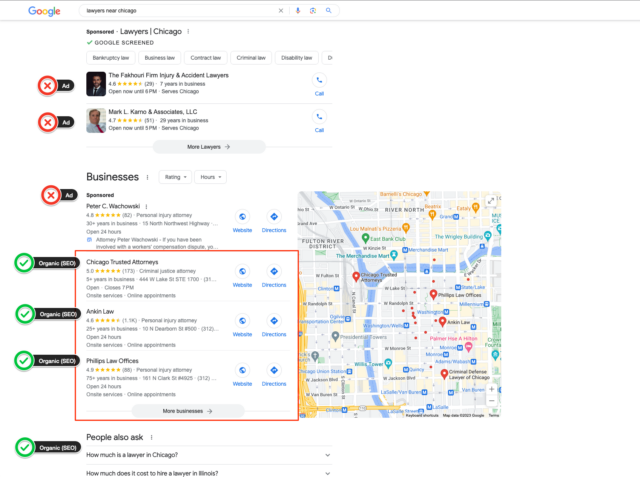
Local Service Ads for Lawyers
Notice the first two results. These are Local Services Ads listings (denoted by red x and Ad). With this advertising product, lawyers pay Google per lead. The third result (also denoted by red x and Ad) is also an advertising listing. This time from Google Ads, their pay-per-click auction platform.
Lawyers are eligible to run Local Services Ads where available. Lawyers participating in Local Services Ads are also eligible to apply for Google Screened designation. At the time of writing, Google Screened is currently only available in select verticals in the US and the UK.
On Local Services Ads listings, lawyers who meet the eligibility criteria receive the Google Screened icon: ![]()

At the risk of stating the obvious, advertising is not SEO. While I won’t go deeper into Local Services Ads here, I encourage you to learn more from Navah Hopkin’s guide for BrightLocal.
The fourth result of that SERP starts the organic Local Pack results (denoted by green check and Organic SEO):
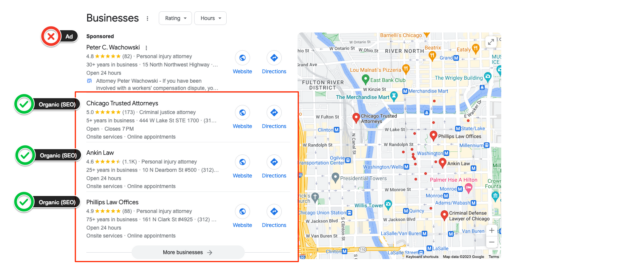
Local Pack for Lawyers
Local Pack listings come from a business’s Google Business Profile (GBP) listings. If you’re new to Google Business Profiles, check out BrightLocal’s GBP Guide.
Generally speaking, according to Google, these results are generated based on the relevance, distance, and prominence ranking factors.
In my experience, the lawyers and law firms that tend to have the most local pack visibility share the following three characteristics:
- Distance (proximity) – They are very close to what Google believes is the searchers location or to the location term used in a search.
- Prominence: Reviews – They tend to have the most reviews and positive ratings.
- Prominence: Links – They tend to have robust back link profiles (in terms of number of linking root domains), particularly with respect to geographic relevance (i.e. local links).
Whether you’re hanging your shingle for the first time, moving, or opening new office locations, you ought to consider the importance of proximity to your law office’s physical location in the context of local SEO. In my experience, you should be weighing the following factors:
- Proximity to target audience.
- Relative competition level near and at location.
Andy Simpson provides an excellent personal injury attorney example in How to Choose the Next Location for Your Business Using Local SEO.
In my experience, you ought to try to avoid being at the same location as other law firms, and in particular, those with the same GBP categories as yours.
Beyond distance, prominence is the factor to spend most of your resources. Law firms that are able to earn a competitive number of reviews on GBP and around the web, tend to enjoy the highest local pack visibility.
Lawyers should focus on earning a competitive number of reviews on GBP first. These are essential both for visibility, as well as converting local pack visibility into potential clients.
After reviews on your own GBP, I recommend focusing on legal services review sites, review sites that rank for searches on your name, and then the general review sites.
Of course, you should also build citations. Start with the top citation sites for attorneys. As with links, make sure you prioritize citation sites that rank for your target queries. Google is already telling you these sites are relevant since they are surfacing them for your queries.
Finally, despite recent reports of their demise, in my experience, links still matter a lot. But, not all links have equal value. Instead of trying to scale links from high DA sites, find ways to earn topically and locally relevant links.
Here are a few ways to do effective local link-building:
- Go hyper-local. Begin your prospecting research with Google Maps. Start with your business location and radiate outward to uncover more local link-building opportunities (i.e., neighborhoods, blocks, and other hyper-local language).
- Use crawlers to identify link opportunities. Many local sites have a variety of issues that present great opportunities for local link-building (i.e., broken links, linking to outdated content, etc). Crawlers can also make it much easier to identify the path of least resistance for earning a link (for example they already link to pages like yours).
- Use competition-informed prospecting. Look for sites linking to your competitors but not to you… but don’t obsess over copying competitor link profiles. Most of the links you’ll find there probably aren’t helping much. You’ll waste a lot of time and money trying to build links that won’t move the dial.
I know there are many other local search ranking factors. I’m well aware of the impact of changing your firm’s name to include keywords, adding services, and the impact of behavioral signals (engagement with your GBP profile). But, if I had to narrow it to three, I’d take distance, reviews, and links.
You may also see examples of local pack listings that don’t have these characteristics.
More often than not, these are the result of spam or otherwise incompliant Google Business Profiles (i.e. lead generation sites, etc). Like all spam, these tactics work, until they don’t. In some cases, participating in these schemes, at least in the United States, may also run afoul of the Rules of Professional Conduct governing a lawyer’s conduct.
GBP Guidelines for Individual Lawyer Practitioners
Google Business Profile Help provides guidelines for individual practitioners:
An individual practitioner is a public-facing professional, typically with their own customer base. Doctors, dentists, lawyers, financial planners, and insurance or real estate agents are all individual practitioners. Business Profiles for practitioners may include title or degree certification (for example Dr., MD, JD, Esq., CFA).
An individual practitioner should create their own dedicated Business Profile if:
- They operate in a public-facing role. Support staff should not create their own Business Profiles.
- They can be contacted directly at the verified location during stated hours.
A practitioner shouldn’t have multiple Business Profiles to cover all of their specializations. Sales associates or lead generation agents for corporations aren’t individual practitioners and aren’t eligible for a Business Profile.
Multiple practitioners at one location
If the practitioner is one of several public-facing practitioners at this location:
- The organization should create a Business Profile for this location, separate from that of the practitioner.
- The title of the Business Profile for the practitioner should include only the name of the practitioner, and shouldn’t include the name of the organization.
There are several issues to be solved when deciding whether to create individual practitioner profiles.
First, note that the guidelines only permit one listing per practitioner. Per the guidelines, lawyers ought not create GBP listings for every practice area they serve. Multiple practice areas should be addressed through categories.
Second, Google may prefer one business listing over another for the same business. For example, a physical office location listing may compete with an individual practitioner listing for the same query. Sometimes, individual practitioner listings with fewer reviews may appear instead of an office listing with many more reviews. This may be undesirable from a branding and conversion perspective.
Third, law firm owners should have clear policies relating to ownership of individual GBP listings. Keep in mind that reviews are attached to listings. Therefore, if an individual lawyer earns reviews on their individual practitioner listing, those reviews travel with that listing and may travel with the lawyer to a competitor firm.
Generally speaking, solo and small firms that aren’t serving a high volume of clients should consider consolidating their “GBP equity” in fewer profiles. Creating profiles for several locations and practitioners, without earning a competitive quantity of reviews, is unlikely to deliver value in terms of new clients from those profiles. On the other hand, larger firms with high volumes of clients ought to be strategic in terms of maximizing their visibility across locations and practice areas.
Tactical Google Business Profile Optimizations for Lawyers
Business Name
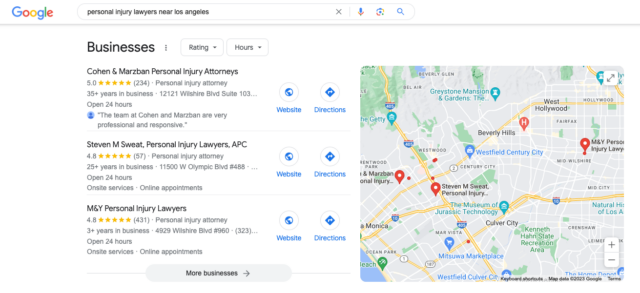
If you perform any bottom-of-the-funnel “lawyer lookup” search for a competitive location and practice area, you’ll likely see at least one firm that has keywords in their business name. In fact, in many competitive legal SERPs, you will likely find all three listings taking advantage of this tactic. Like it or not, at the time of writing, this works really well.
Before you go updating your GBP’s business name field, there are a few things you ought to consider.
First, what are the potential consequences for your brand? By adding keywords, you may actually dilute or harm your brand equity.
Second, you should be sure that your jurisdiction allows for the use of trade names.
Third, if you’re inclined to change your firm name, be sure to officially change it with both your state bar and your state’s business registry. Failing to officially change your name may lead to issues with your GBP listing including suspension.
Business Category
Selecting business categories can have significant consequences on both your firm’s local pack visibility and conversion. Ideally, you will be able to select a primary category that is most relevant to your practice. You should also add as many additional relevant categories as are available.
While some local SEO consultants have suggested that adding several additional categories may “dilute” a listing’s visibility, that has not been my experience.
Keep in mind that those categories are displayed in local pack listings. While Google will generally match the most relevant category with the query, the machine doesn’t always get it right. Conduct your own tests and experiments to see what impact various category settings have on your visibility and ability to convert searchers into potential clients.
Photos & Videos
People tend to hire lawyers, not logos. Using photos and videos on your GBP is one of the most effective ways to motivate a searcher to engage with your listing and convert them from a searcher to a potential client. Here are some examples of photos and videos that tend to be effective for lawyers:
- Client testimonials: You can convert testimonials into graphics and record happy clients singing your praises.
- Community service: Highlight local community service involvement.
- Leadership: Highlight professional recognition and leadership positions.
- Explainer videos: Create videos that share your knowledge, skill, and experience in a particular field.
- USP videos: Create videos that position you as an expert in your niche. Describe why you are uniquely qualified to serve your clients’ needs
Products & Services
Lawyers tend to think in terms of services, not products. However, in the context of GBP, lawyers should consider adding Products to their profiles.
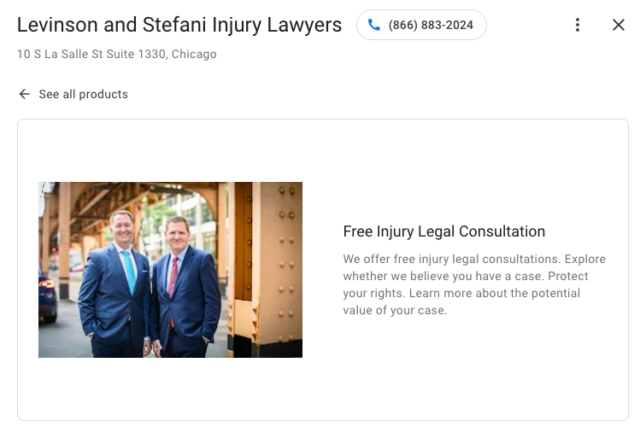

GBP Products get a lot of real estate in SERPs. They’re also highly visual.
In addition to this, GBP Services seem to disproportionately impact visibility. Put simply, adding as many relevant services as possible seems to impact local pack visibility more than it ought to.
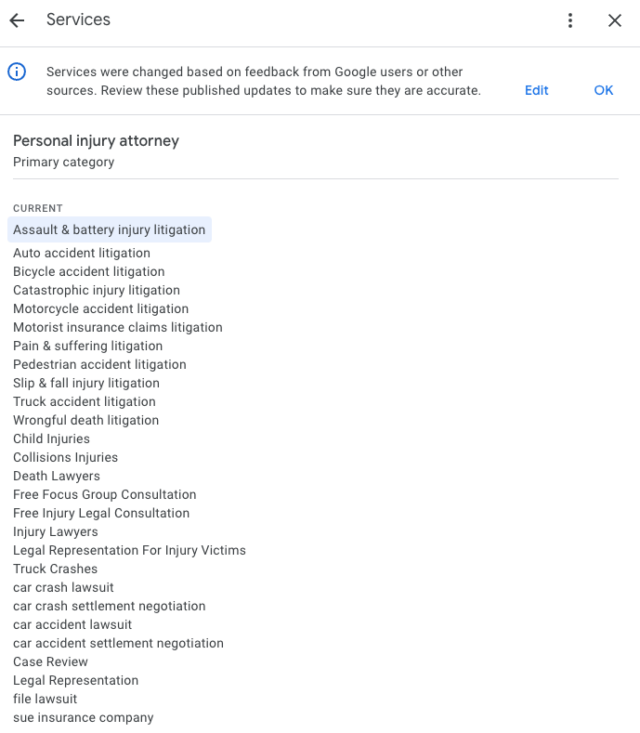
Services also enjoy prominent visibility in local pack and map finder results.

Consider the impact of various Services on your firm’s ability to convert searchers into potential clients.
Check out Claire Carlile’s Add and Manage Google Business Profile Products and Services.
Updates

GBP updates are effective for driving engagement and conversion. Law firms ought to test updates for various stages of the legal services consumer journey. Use UTM tagging with Google Business Profile Update links. That way, you can test which Updates are driving the most engagement and even clients!
Localized Organic for Lawyers
Now let’s turn to localized organic results. Here are some of the localized organic results for the same example query “lawyers near chicago”:
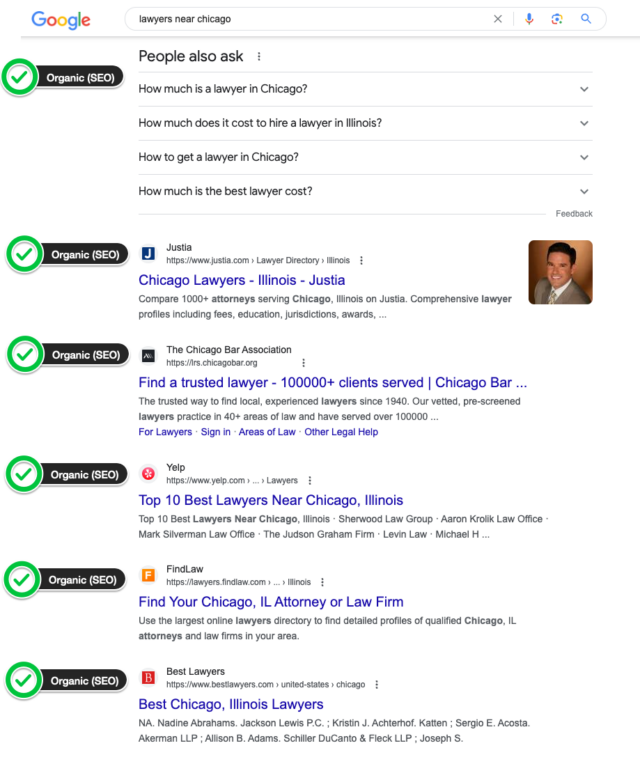
Bear in mind that for most bottom-of-the-funnel legal queries (i.e. include lawyer or law firm), localized organic results appear below Local Services Ads, Ads, and Local Packs.
Instead of prioritizing ranking for these queries, your localized organic search strategy should focus on top-of-the-funnel research queries (i.e. how do I file…). These types of queries tend not to show LSAs and Local Packs. Therefore, the traditional localized organic results appear much more prominently.

Notice that this query is not geomodified but Google is still showing localized results based on what they know about the location of the searcher (in this case me, in Michigan).
When planning your local content strategy, be sure to research and analyze localized organic SERPs to understand what Google is showing for both geographically modified and unmodified queries. While these queries might not convert to clients at the same rate as bottom-of-the-funnel searches, based on their volume, they can be quite valuable.
In my experience, localized organic search success depends even more heavily on links than the local pack. These results tend to be dominated by large sites with many links. These typically include:
- Legal Directories
- General Directories
- Legal Review Sites
- Law Firms
If you have a newer site with limited content or a site that has struggled to earn links, it will be difficult to rank in competitive localized organic search. However, you may find success in the long tail if you go hyper-local and practice niche. There tends to be much less competition in these SERPs and there can still be a lot of value even without much volume.
Final Thoughts
Local law firm SEO can be extremely competitive. If you’re in any major metropolitan area with a direct-to-consumer practice (i.e. personal injury, criminal defense, divorce, etc), it can be very difficult to command the most local pack market share. Nonetheless, you should commit to making a long-term investment in improving your local pack visibility. It is among the most valuable online attention you can earn.
Begin by developing excellent systems for potential client and client experiences
This must include empathetic and professional intake. Too many firms focus on ranking only to end up with negative reviews due to poor intake experiences. Reviews are the most valuable aspect of local law firm SEO.
Next, get active in your local community
Ideally, find local organizations and events that overlap with the clients you serve. For example, personal injury lawyers might co-sponsor an event with a physical therapy or rehabilitation company or organization.
These investments can have a remarkable impact on your business. Plus, they can drive valuable local links. These local links are among the most competitive difference-makers in local SEO.
Finally, get social
The impact of social media on local SEO is undeniable. Social tends to be one of the most effective distribution channels for content marketing. Not to mention that video content from YouTube and other social platforms regularly surfaces on local legal queries.
Further, Google’s announcement of Perspectives is likely to increase the importance of publishing on social and forum sites in the context of local SEO. Publish video content on these platforms regularly.
Follow this plan and regularly execute and you will begin to see meaningful results. Local law firm SEO lends itself to measurement. Measure the value of new clients all the way back to a local search. You will likely find that it remains one of the most valuable online legal marketing channels.
